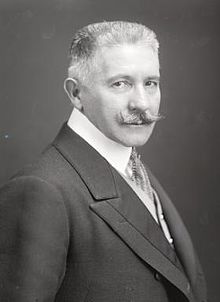Wladimir Giesl von Gieslingen
Wladimir Giesl Freiherr von Gieslingen (born February 18, 1860 in Fünfkirchen (today Pécs ), Austrian Empire , † April 20, 1936 in Salzburg ) was an Austrian diplomat and general .
Life
Wladimir was the younger son of the later Feldzeugmeister Heinrich Karl Giesl Freiherr von Gieslingen . His older brother was General Arthur Giesl von Gieslingen . After his training in the Theresian Military Academy , Vladimir was assigned to a Uhlan regiment in 1879 . In 1884 he became a member of the General Staff . Until 1893 he served in various units in Tarnów , Brno , Sarajevo and Theresienstadt .
In 1893 Giesl became a military attaché at the Austro-Hungarian embassy in Constantinople , and was promoted to major the following year. After the end of the Turkish-Greek war over Crete , Giesl belonged to the international "Gendarmerie Command" which ensured peace on the Mediterranean island. In 1898 he was also appointed military attaché in Athens and Sofia . In 1906 he was promoted to major general and upgraded to military plenipotentiary for the embassies in Constantinople and Athens. In April 1907 Giesl belonged to the delegation of the Danube Monarchy at the second Hague Peace Conference . In 1909 Giesl was appointed ambassador extraordinary and plenipotentiary minister in Montenegro , and a year later he was promoted to field marshal lieutenant . In 1913 he was appointed kuk envoy in Belgrade .
On June 28, 1914, the Austrian heir to the throne, Archduke Franz Ferdinand , was assassinated in Sarajevo . On July 23, 1914, Austria-Hungary presented Serbia with a sharp ultimatum limited to 48 hours . As envoy in Belgrade, it was Wladimir Giesl von Gieslingen's job to hand over the demarche to the Serbian government . According to Foreign Minister Leopold Berchtold's orders , Giesl left the country 48 hours after the handover, after Serbia did not unconditionally accept the ultimatum. These events, called the July Crisis , led to the First World War . On July 28, 1914, Austria-Hungary declared war on Serbia. Although Giesl did not belong to the so-called “war party” in Vienna and had only strictly followed his instructions, his contemporaries were aware that “a general had taken this important step towards war”.
After his return to Vienna acted Giesl as a liaison officer of the State Department for army - headquarters . Chief of Staff Franz Conrad von Hötzendorf distrusted Giesl and accused him of having passed military secrets to the Foreign Ministry. After Giesl's request for transfer to the fighting troops was rejected in 1915, he retired. In 1917 he was sent again on a diplomatic mission to Constantinople, where he prepared a visit from Emperor Karl .
After the war he lived in seclusion near Bad Radkersburg . In February 1931 he joined the NSDAP in Salzburg and appeared as a speaker for the party at numerous election events. His estate is in the Austrian State Archives .
literature
- Reinhold Lorenz: Giesl von Gieslingen, Wladimir Rudolf Karl Freiherr. In: New German Biography (NDB). Volume 6, Duncker & Humblot, Berlin 1964, ISBN 3-428-00187-7 , p. 389 f. ( Digitized version ).
- Eduard Ritter von Steinitz: Two decades in the Middle East. Notes of the General of the Cavalry Baron Wladimir Giesl. Berlin 1925.
Individual evidence
- ↑ a b c d e Wladimir Giesl von Gieslingen Wladimir Frh .. In: Österreichisches Biographisches Lexikon 1815–1950 (ÖBL). Volume 1, Verlag der Österreichischen Akademie der Wissenschaften, Vienna 1957, p. 439.
- ↑ Austro-Hungarian Army - Wladimir Giesl Freiherr von Gieslingen (English)
- ↑ Günther Kronenbitter: "War in Peace". The leadership of the Austro-Hungarian army and the great power politics of Austria-Hungary 1906-1914. Verlag Oldenbourg, Munich 2003, ISBN 3-486-56700-4 , pp. 254f.
- ^ Franz Schausberger : Everyone to the gallows! The political “takeoff” of the “Hitler movement” in the Salzburg municipal elections in 1931. Böhlau, Vienna 2005, ISBN 3-20577-340-3 , pp. 71f.
- ↑ Wladimir Giesl von Gieslingen. Austrian State Archives
| predecessor | Office | successor |
|---|---|---|
| Karl Macchio (until 1903) |
Austro-Hungarian ambassador to Montenegro 1909–1913 |
|
| Stephen of Ugron to Ábránfalva |
Austro-Hungarian ambassador to Serbia 1913–1914 |
- |
| personal data | |
|---|---|
| SURNAME | Giesl von Gieslingen, Vladimir |
| ALTERNATIVE NAMES | Giesl Freiherr von Gieslingen, Vladimir |
| BRIEF DESCRIPTION | Austrian diplomat and general |
| DATE OF BIRTH | February 18, 1860 |
| PLACE OF BIRTH | Pécs |
| DATE OF DEATH | April 20, 1936 |
| Place of death | Salzburg |
